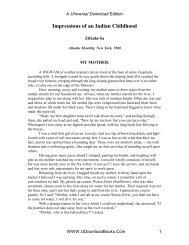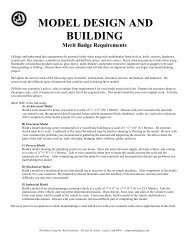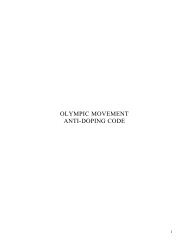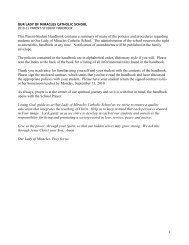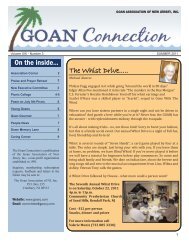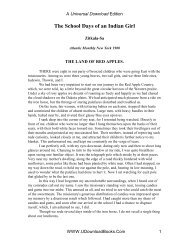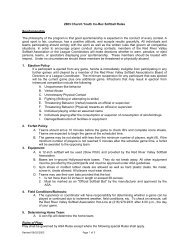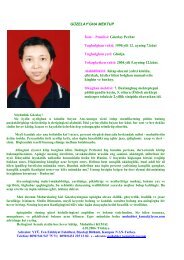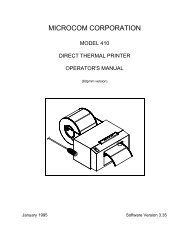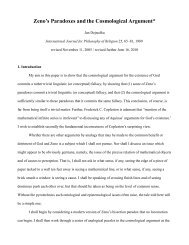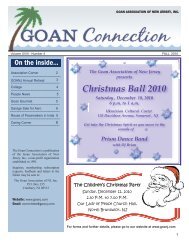Dummett's Backward Road to Frege and to Intuitionism - Tripod
Dummett's Backward Road to Frege and to Intuitionism - Tripod
Dummett's Backward Road to Frege and to Intuitionism - Tripod
You also want an ePaper? Increase the reach of your titles
YUMPU automatically turns print PDFs into web optimized ePapers that Google loves.
composed of simpler logical subject- <strong>and</strong> predicate-names.<br />
We must also not be confused by <strong>Frege</strong>’s statement that “I call anything a proper name if it is a<br />
sign for an object” (1970d: 47 n.*). Dummett is wrongly converting this <strong>to</strong> “If anything is a proper<br />
name, then it names an object.” The conversion is restricted <strong>to</strong> cus<strong>to</strong>mary references.<br />
Dummett himself cites a text that “an object such as Mont Blanc cannot be part of a<br />
thought”(1981a: 533n). Indeed, Dummett knows as well as anyone it is <strong>Frege</strong>’s famous view that “the<br />
object is not...itself a constituent of the thought,” <strong>and</strong> that an object such as a mountain “is not the sort<br />
of thing that can be a constituent of a thought” (1981a: 130; see 137–38, 177, 533n). Yet Dummett<br />
insists just two pages later that “at least some senses are objects” (1981a: 132). Dummett’s way out is<br />
<strong>to</strong> say that it is only wirklich or concrete objects that cannot be senses (1981a: 393). I disagree. <strong>Frege</strong>’s<br />
terminology is misleading. What we would normally call his realism, he calls objectivism. It is<br />
objective entities as such that are logically mind-independent, i.e., exist <strong>and</strong> are as they are<br />
independently of the manner in which we think of, regard, conceive, or speak of them. “Wirklich”<br />
ordinarily translates as “actual” or “real.” <strong>Frege</strong>’s “wirklich” is best translated as “causal.” He has in<br />
mind a causal activity or capacity that has nothing <strong>to</strong> do with the issue of metaphysical realism. Senses<br />
are not wirklich; they can act on us only in the passive sense of being sometimes grasped by us, <strong>and</strong><br />
thus affecting how we regard things. That is a special but secondary reason why concrete objects<br />
cannot be senses. The general <strong>and</strong> primary reason is that <strong>to</strong> allow any object, wirklich or not, <strong>to</strong> be a<br />
part of a thought would destroy the objectual realism implicit in <strong>Frege</strong>’s sense-reference distinction. It<br />
is not just our accompanying subjective idea, but even our objective sense via which we think about a<br />
mountain, that must be distinguished from the mountain itself. <strong>Frege</strong> says, “[W]hen we say ‘the Moon’,<br />
we do not intend <strong>to</strong> speak of our idea of the Moon, nor are we satisfied with the sense alone, but we<br />
presuppose a reference”(1970f: 61, my emphasis). And <strong>Frege</strong> applies this realism, which he calls his<br />
objectivism, with the strictest sameness <strong>to</strong> abstract objects. This is precisely <strong>Frege</strong>’s solution of what<br />
46




